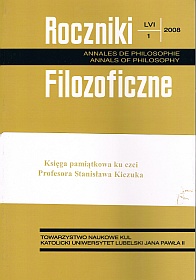Algebra of Deontic Notions
Abstract
Leibniz suggested that deontic modalities can be defined in terms of the alethic modalities; according to him, the permitted (licitum) is what possible for a good man to do and the obligatory (debitum) is what is necessary for a good man to do. The paper starts from specifying a connection of deontic concepts with the moral values. The connection comes down to define an isomorphism of two Boolean algebras: from deontic one onto axiological one. The work presents theories of two algebras of deontic notions: the algebra of sets and the Boolean algebra.
The theory of deontic set is based on the two axioms: xÎV (an act x is an element of the set of acts subordinated to some norm or law) and x''=x (an act x is identical with double denial of x). By means of definitions following notions are introduced: Λ (the empty set of acts), N (the set of ordered acts), Z (the set of forbidden acts), P (the set of obligatory acts), F (the set of optional acts), D (the set of permitted acts), I (the set of indifferent acts).The calculus is structured by rules of the Słupecki-Borkowski’s suppositional deduction. Forty five theorems are proven in this calculus.
The second theory presented in the paper, is a Boolean algebra of deontic notions. Added to the theory of equality, it takes axioms from the theory of Boolean algebras with addition of a specific axiom for the deontic system i.e., N = N∩D. Sixty four theorems are proven in this calculus.
References
Dubish R.: Lattices to Logic, New York 1964.
Hilpinen R.: Deontic Logic, [w:] L. Goble (ed.), The Blackwell Guide to Philosophical Logic, Oxford 2001.
Kalinowski J.: Logika norm, Lublin 1972.
Tokarz M.: Wprowadzenie do logiki, Katowice 1984.
Wojciechowska A.: Elementy logiki i teorii mnogości, Warszawa 1979.
Copyright (c) 2008 Roczniki Filozoficzne

This work is licensed under a Creative Commons Attribution-NonCommercial-NoDerivatives 4.0 International License.





